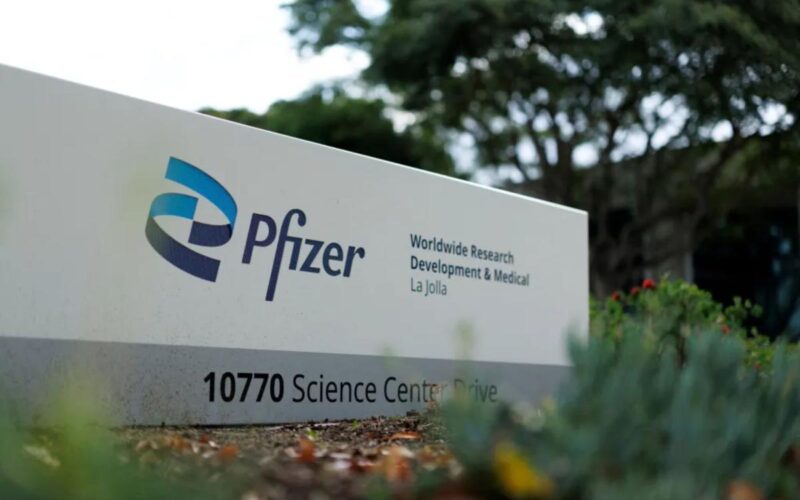U.S. drugmaker Pfizer has clinched a $10 billion deal for obesity drug developer Metsera, capping a fierce biotech bidding war between the New York-based pharma giant and Danish rival Novo Nordisk.
Metsera accepted a sweetened offer from Pfizer late on Friday, citing U.S. antitrust risks in Novo’s bid that it had previously called superior. The Danish obesity drug behemoth said on Saturday it would exit the race.
The bidding war win hands Pfizer a way into the lucrative obesity drug market, even if Metsera’s treatments remain years from hitting the market. It marks a blow for Novo as it tries to claw back lost ground against U.S. rival Eli Lilly.
Twists and turns in a biotech bidding war
Pfizer appeared to have locked up the deal in September before Novo jumped in last week with an unsolicited offer, sparking a fight for a coveted asset in the growing weight-loss market. Pfizer is trying to gain a toehold in obesity to overcome past in-house stumbles in developing weight-loss drugs.
Pfizer has agreed to pay $86.25 per share in cash, a premium of 3.69% to Metsera’s Friday close, Metsera said in a statement. The offer includes $65.60 per share in cash and a contingent value right entitling holders to additional payments of up to $20.65 per share in cash.
Novo Nordisk on Saturday said it would not be making an increased offer.
“Following a competitive process and after careful consideration, Novo Nordisk will not increase its offer to acquire Metsera,” the Danish drugmaker said in a statement.
Novo added that it is advancing its own pipeline of treatment options for obesity, and that it would “continue to assess opportunities for business development and acquisitions … that further its strategic objectives.”
A source close to Novo said that its last unsuccessful bid had been the “maximum value” of Metsera and that the firm remained confident in its own obesity drug pipeline. The deal was never “do or die” for Novo.
“This was always a bolt-on acquisition for Novo,” the person said.
‘Unacceptably high legal and regulatory risks’
The escalating M&A game sent Metsera’s shares surging over the last week. From just before Novo stepped in with its bid through Friday’s close, Metsera shares gained nearly 60%, sending its market value to $8.75 billion.
For a time, it appeared Novo had the inside track. Novo has been trying to recover its once-commanding position in obesity drugs that it lost to Eli Lilly.
Metsera, in its Friday statement, said Novo’s proposal presented “unacceptably high legal and regulatory risks” compared to the proposed merger with Pfizer, citing a call from the U.S. Federal Trade Commission to discuss the risks of a transaction with Novo. The regulator sent a letter earlier this week to Novo and Metsera, saying their proposed deal ran the risk of violating U.S. antitrust laws.
Novo said in its statement that it believed that the structure of its offer was “compliant with antitrust laws”.
In a statement, Pfizer said it was pleased to have reached a revised agreement with Metsera, and expects to close the merger soon after Metsera’s November 13 shareholder meeting.
‘Game of Thrones’ style bidding war for Metsera
Bernstein analyst Courtney Breen said the $10 billion price rested on optimistic assumptions about the future performance of Metsera, saying Pfizer would need to assume $11 billion in revenue by 2040, nearly double Metsera’s current projections. She pointed to growing scepticism around long-term GLP-1 pricing, which could compress margins.
Metsera’s board recommended its shareholders approve the amended Pfizer offer. The biotech company currently loses money and analysts expect additional losses while its drugs are still in development.
The bidding war between Pfizer and Novo lifted the price from Pfizer’s $7.3 billion offer in September. Former Pfizer research-and-development chief John LaMattina told Reuters the battle was reminiscent of Pfizer’s 2000 hostile takeover of Warner-Lambert for $90 billion in an effort to gain control of Lipitor, a cholesterol-lowering drug.
“While this is a smaller deal, Pfizer must believe that Metsera’s pipeline is key for its future,” he said.
Analysts and investors pointed to the unusually fierce fight to gain control of Metsera, whose early-stage obesity treatments remain unproven but could be key in a market some analysts estimate will hit $150 billion by early next decade.
“This is a Game of Thrones-level of play,” Peter Kolchinsky, managing partner at RA Capital, a top-20 Metsera shareholder, before the final bid was accepted.
Metsera’s experimental obesity drugs, MET-097i, a GLP-1 injectable, and MET-233i, which mimics the pancreatic hormone amylin, are projected to reach $5 billion in combined peak sales, according to Leerink Partners analyst David Risinger.








